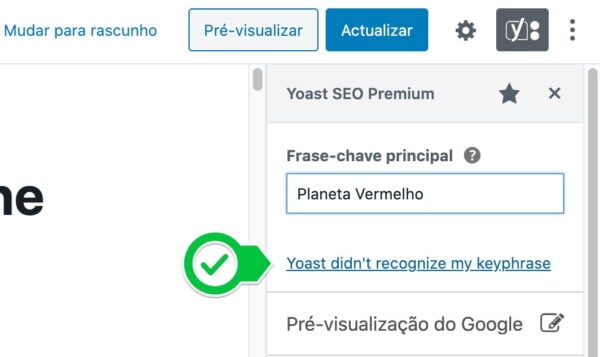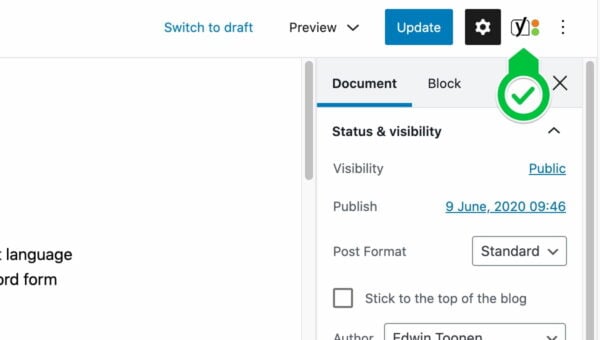Yoast SEO 14.6: New languages with word form support

We have a new release for you: Yoast SEO 14.6. This release has some pretty cool enhancements, plus new additions for Yoast SEO Premium users. We’re continuing our run of languages that get word form support with two new ones: Indonesian and Portuguese. Find what’s new in Yoast SEO 14.6!
Word form recognition in Yoast SEO Premium
We all know high-quality content is essential for any site. Producing that amazing content, however, is not always so easy. For many of you, writing doesn’t come natural, so you welcome help with open arms. This is one of the reasons why we introduced the readability analyses way back when.
The analyses work well and it gives you advice you can count on, but, sometimes, it can feel as if you are trying to please the machine and not the human, so to say. We get that. Text analysis and recognition is hard, but we’ve managed to make a lot better with word form support in Yoast SEO Premium. Thanks to this, the plugin can now recognize different grammatical forms of your focus keyphrase, making it easier to optimize your text. Plus, as a Premium user you also get to use the synonyms and related keyphrase feature.
As of Yoast SEO 14.6, if you write in Indonesian or Portuguese, you can get a more flexible, natural writing and editing environment. All these tools are fine-tuned to help you build the best possible content, without having to think about awkwardly fitting in keywords to get green bullets.
Wondering how that works? Check out the videos! Yes, we did a video for each language:
List of languages
The list of languages that have word form support is getting longer and longer, with more on the way!
- English (since Yoast SEO 9.0)
- German (since Yoast SEO 10.1)
- Dutch (since Yoast SEO 13.4)
- Spanish (since Yoast SEO 13.5)
- French (in beta, since Yoast SEO 14.1)
- Russian (in beta since Yoast SEO 14.2)
- Italian (in beta since Yoast SEO 14.3)
- Indonesian (in beta since Yoast SEO 14.6)
- Portuguese (in beta since Yoast SEO 14.6)
In beta: help us improve!
In Yoast SEO 14.6, we’re adding two new languages: Portuguese and Indonesian. Again, this is a beta release, and we’d like you to help us improve it. Now, we can find and recognize word forms in Portuguese and Indonesian much better than before, but not as good as the other languages we’ve implemented. That might mean that we don’t recognize every word correctly or that you’re noticing false-positives. If you find that happens, let us know!
There’s a feedback option below the focus keyphrase field that you can use to contact us. Please send us:
- The focus keyphrase you’ve used for this specific piece of text.
- The sentence in which you’ve noticed one of the assessments working incorrectly for the focus keyphrase you mentioned above.
You can do this for all languages now in beta: French, Russian, Italian, Indonesian and Portuguese.

Improving editing
In Yoast SEO 14.5, we introduced a new publishing flow that helps you keep track of your SEO scores during every part of the publication process. In Yoast SEO 14.6, we’ve added another helpful indicator that lets you see your scores for a particular post — quickly. We made the plugin icon in the editor reflect the SEO and Readability score. Cool, right? We’ve also improved the editing experience in the Social tab and give that part a dab of fresh paint.

Languages improvements
Yoast SEO 14.6, comes with a number of language improvements. For example, we’ve improved the transition words analysis for Russian, and we’ve improved keyphrase counting in Indonesian. We’ve also rewritten the feedback for the keyphrase in SEO title assessment to make it clear that an exact keyphrase match is necessary. Finally, we’ve improved recognition of keywords that contain a hyphen in the slug (for example: re-duplicated, on-the-go).
Other fixes and enhancements
There’s a lot of other stuff to find in this release and, as always, you can find all changes in the changelog. One of the most interesting is that we’re now automatically noindexing the xmlrpc.php file in WordPress and all possible ways to request it, removing them from Google’s search results. This prevents Google from unnecessarily trying to index these feeds.
Yoast SEO 14.6: Cool stuff
That’s it for Yoast SEO 14.6! In this release, you’ll find many fixes and enhancements. We made a number of improvements to our handling of languages. For our Premium users, we added word form support for Indonesian and Portuguese — bringing the total of supported languages to nine.
We hope you enjoy Yoast SEO.


I’m with Kim. I don’t use the block editor because I don’t like it. I’m much more comfortable with HTML and plain text. Now I scroll all the way down to the Yoast plugin to see what’s happening. It works but not as nicely as it did before. Please consider those who don’t like or use block editors.
Also, please consider those who users who are editing in themes with proprietary editors, like Divi and Avada.
Hi Adrienne, the issue Kim addressed below will be fixed! Is there a specific issue you have with the Yoast SEO meta box that you’d like to share with us? Because it should be working just like before.
The ‘traffic light’ indicator has disappeared from the publish sidebar for those of us still using WP Classic Editor – is there a way to re-enable this? It means we’re not able to see the SEO scores at a glance, which is frustrating.
Hi Kim. Thanks for your comment. We have been notified of this issue and are working hard to fix. I’m not sure yet in which release it will be fixed, so stay tuned.
That’s great to hear – thanks for the update Edwin!
hello any news if in the future it will support and the greek language? thanks a lot.
Hi Alex. We’re working on a number of languages, but I can’t comment on which. Stay tuned!
Good news for Indonesian bloggers who use yoast plugin
We think so too, Munawar!
Yes, but the plugin gives wrong synonyms. I received an email with the example Anjing (which means dog in bahasa Indonesia), but I have asked around and no one knows the word Koyok. In the Yoast Premium newsletter email they write that Koyok is a synonym for Anjing… Even when I tried bahasa Java dan Sunda. They don’t know.
I was looking forward to buying the Premium version, but after this example I am going to wait until I hear the synonyms are right.
Hi Jeroen. I’m not sure you understand how this Premium feature works. The plugin doesn’t suggest synonyms — you do. If you add a synonym or a related keyphrase to a post, the analysis takes those into account. This way, the text isn’t just judged by the focus keyword you set, but also by the synonyms and related keyphrases. So, you don’t have to mention your main focus keyphrase as much because it also looks for instances of the alternatives.
One of our linguists is Indonesian and she helped build this, and she tells me koyok is a well-known synonym for anjing. You can even find it in the official dictionary: https://kbbi.web.id/koyok
Hi Edwin, OK I thought the synonyms were suggested from the dictionary words but I understand now it isn’t. That’s actually not a bad idea.
But I do think you’ll have to you’ll have to talk with your Indonesian linguist, because she is wrong. She probably lives in Holland. I live in Indonesia for 12 years. All my friends are Indonesian. I have asked 10 more friends if koyok is a synonym for anjing and all of them don’t know the word goyok (except for a plaster that produces a warm/hot feeling). Let alone as a synonym for anjing. If a word is in a dictionary doesn’t means people use that word on daily basis. And what is the advantage of writing content using keywords that people don’t know?
The dog example in your newsletter email was just a bad example.
A quick question: If one of the words of my longtail keyword if present in the category name (and I use the category name in the URL), should I add it again later so I get the green check?
Hi Thiago. I am not sure what you mean. Could you elaborate a bit?